Want to know the best SEO platforms that will make you a fantastic website and build your brand image and help you rank higher on Google?
Look no further.
There are two main types of websites: content and product.
Both utilise slightly different SEO strategies, so here’s a list to help you out if you don’t have the time to read the full article:
Content-Based SEO
- WordPress
- Joomla
- Wix
- Squarespace
- Weebly
Product Or Sales Based SEO
- Shopify
- BigCommerce
- WooCommerce
- GoDaddy
- Magento eCommerce
That said, you can technically use one of the content website platforms to build product SEO sites and vice versa, but then you won’t be getting the best bang for your buck.
1. WordPress

Pricing: Free forever; $4 – $50 per month premium plans.
Summary: What started out as a teeny-tiny project for boggers back in 2003 now powers over half of all websites on the world wide web.
WordPress allows customisable permalinks so you can clean out those weird “%” and “#” signs from your URLs, helping them look way more professional.
This is our answer to the oft-asked question, “what is the best website platform for SEO”?
Pros:
- Affordable, value-for-money services.
- Over 50,000 plugins and 8,000 themes.
- Easy template-based design.
Cons:
- Designed as a blogging platform so e-commerce features are slightly weak.
- Steep learning curve.
2. Joomla
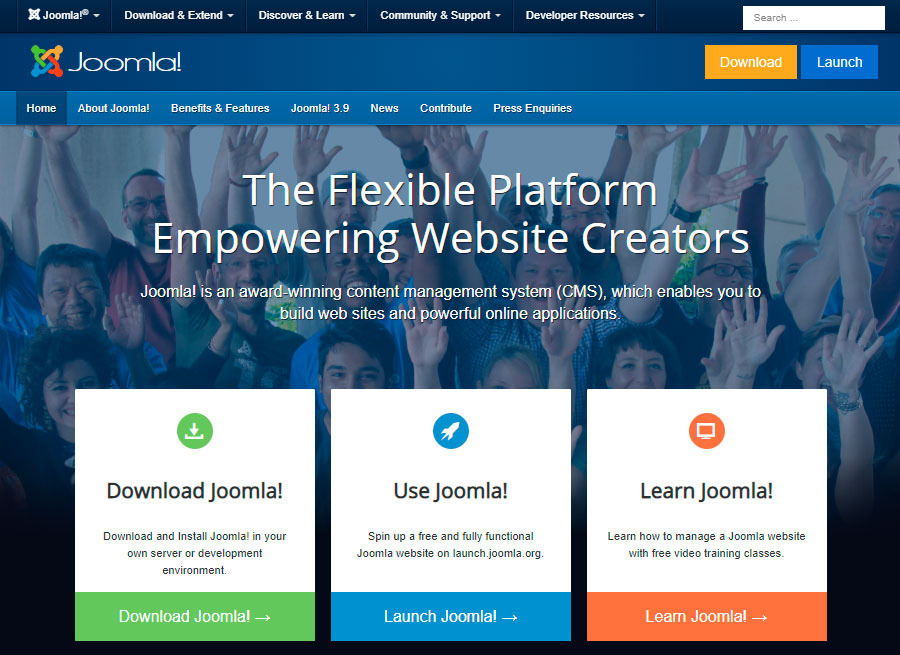
Pricing: Software free forever; Web hosting is separate and paid (varies by choice).
Summary: When people say “Joomla”, they mean the free-to-use CMS (content management software.
With its vast array of SEO tools, it rivals WordPress on many counts, but it has an even steeper learning curve, especially if you’re new to SEO or CMS.
Two of the best features of Joomlas SEO are its super-light core page weights and also its strong microdata and custom metadata support.
Pros:
- Best for multi-page sites.
- Over 6,000 extensions.
- Strong online community.
Cons:
- Not useful on small websites.
- Ultra-steep learning curve.
3. Wix

Pricing: Free Forever; several premium plans. (cheapest is $5).
Summary: Ahhh yes. The infamous Wix SEO. Well, you’ll be glad to know that most of the SEO issues that plagued Wix have indeed, been fixed.
One interesting thing to note is that many Wix sites end up ranking on the #0 spot in Google searches (yes, above #1), though this probably has more to do with the actual content than its SEO.
It still cannot hold a candle to WordPress or Joomla, but it’ll get the job done perfectly for small blogs or other single-page websites.
Pros:
- Affordable; drag-and-drop interface is easy to use.
- Site “wizard’ automatically optimises SEO.
- Best introduction to SEO for beginners.
Cons:
- The builder is “locked” so advanced SEO tools aren’t available.
4. Squarespace

Pricing: Free Forever; $10 – $40 per month premium plans.
Summary: Think of Squarespace as the middle ground between the SEO power of WordPress and Wix’s ease of use.
If you find the customisation capabilities too limited, you can always pop over into an HTML editor and tailor the component in question to your taste.
Pros:
- Support for alt-text has now been added (about damn time).
- Auto-generated sitemap.
- Strong support for Google Search Console and Bing Webmaster.
Cons:
- No plug-ins.
5. Weebly

Pricing: Free Forever; $7 – $35 per month premium plans.
Summary: Most people use Weebly to build single-page websites like blogs and online portfolios.
If we’re being totally honest with each other, Weebly’s SEO offerings don’t stack up well against other names on this list.
That said, if your requirements are absolutely basic then Weebly will get the job done but don’t expect any super-advanced tools like canonical tag support or bot blockers,
Pros:
- Easy modification of HTML and CSS elements.
- SEO “post title” and “post description” elements can now be edited.
Cons:
- If you try to edit past URLs it hurts your SEO, massively.
6. Shopify

Pricing: 14-day free trial, $10 – $300 per month premium plans.
Summary: Shopify is pricey but to be fair, they are the best website platform for SEO when it comes to e-commerce.
Shopify offers canonical instruction support, editable robots.txt files, and an extremely good auto-generated sitemap (that you cannot edit).
Pros:
- Supports 301 redirects.
- Excellent uptime (99.98%), speed, and support (online chat and community).
- Easy to edit image HTML alt-text.
Cons:
- Sometimes you don’t want certain pages indexed; this is only via custom code in Shopify.
7. BigCommerce

Pricing: Free Forever; $30 – $300 per month premium plans.
Summary: With its arsenal of SEO tools like adaptive auto-populated URLs, low risk of 404 errors, and strong rewrite and redirect CDN (content delivery network), BigCommerce is a pretty decent SEO platform for agencies with high sales.
The biggest caveat is the pricing: you start with the $30 basic plan but as soon as you reach $50,000 in sales you automatically get upgraded to the $80 per month plan.
This “auto-upgrade” will continue based on your sales and income, kind of like a commission.
Pros:
- Excellent SEO even for the base plans.
- Built-in microdata; customisable metadata.
- Automatically gives each page a unique URL.
Cons:
- Pricing
8. WooCommerce
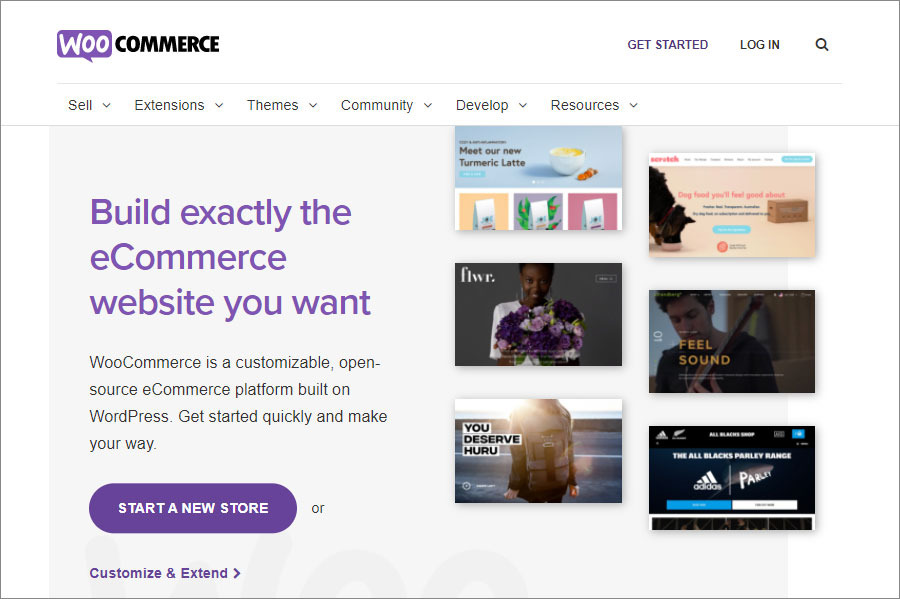
Pricing: Software free forever; Web hosting is separate and paid (varies by choice).
Summary: As a platform for SEO, WooCommerce is one of the few that is optimised out of the box,
Today, WooCommerce powers about 30% of all online stores as an additional plugin for sites built on WordPress.
WooCommerce lets you customise every aspect of your site SEO, and it supports additional plug-ins like Yoast, Rank Math, and The SEO Framework.
Pros:
- Allows editing of all page elements.
- Beginner-friendly.
- Free forever.
Cons:
- Some of the most crucial extensions are paid ones (e.g. credit card acceptance tools).
9. GoDaddy
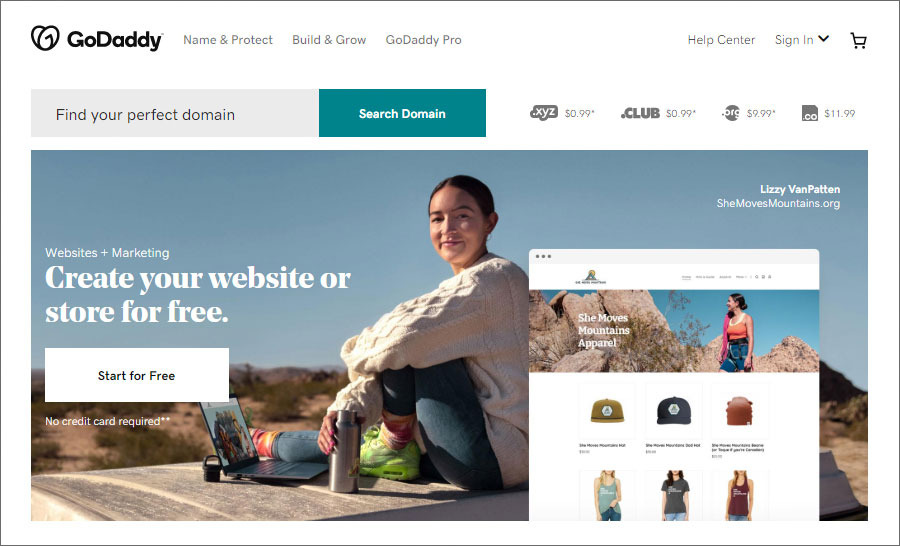
Pricing: $6.99 per month
Summary: Although it used to be a bit shady, GoDaddy does have a couple of SEO tools to offer that are pretty useful.
With the SEO team doing most of the work for you, all you need to do is click “OK” and all approved changes will go live automatically.
The online reviews aren’t glowing though, so the only major plus point for GoDaddy’s SEO is the pricing.
Pros:
- Auto personalised keyword suggestions.
- Entire site gets optimised in a few clicks.
24×7 support
Cons:
- Value-for-money results only on GoDaddy hosted websites.
- Low level of customisation.
10. Magento e-Commerce
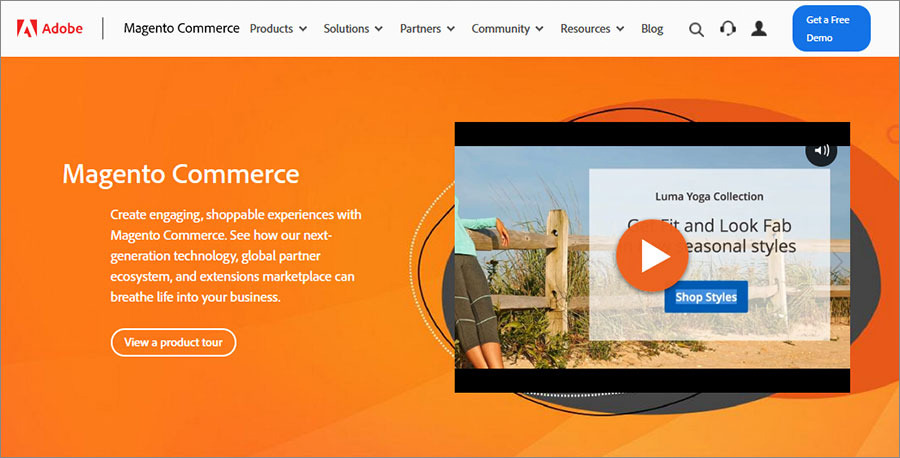
Pricing: Has free version; paid version pricing will be based on store revenue.
Summary: Magento has a free version called “Magento open-source” that is suitable for small to medium businesses.
The paid (Magento e-commerce) version’s pricing will be a percentage of your store revenue and adds features like canonical tags and XML sitemaps.
The open-source version may well meet your needs but is limited in terms of canonical tags, canonical URLs, and its auto-sitemap tools.
Pros:
- Both HTML and XML sitemaps supported.
- Editable robots.txt files right out of the box.
- Auto log cleaning and file caching.
Cons:
- Unclear pricing.
- Cannot enable more than one sitemap at the same time.
The key takeaway here is that every one of these platforms can do everything the others can; some just make doing it that much easier.
The trick is knowing what you want: if your e-store is your priority, go with an e-Commerce solution like Shopify. If a content website with a store as a “side” feature is your goal, go with a content-based SEO solution like WordPress.


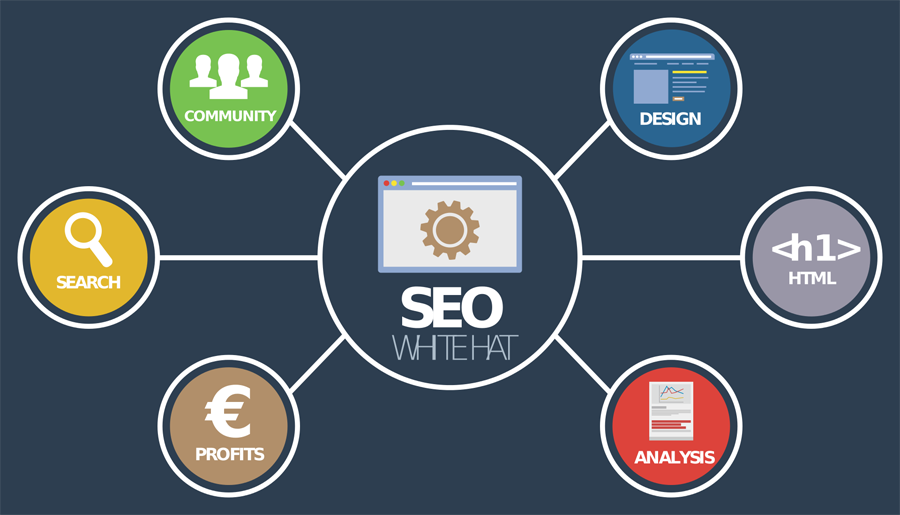



Leave A Comment